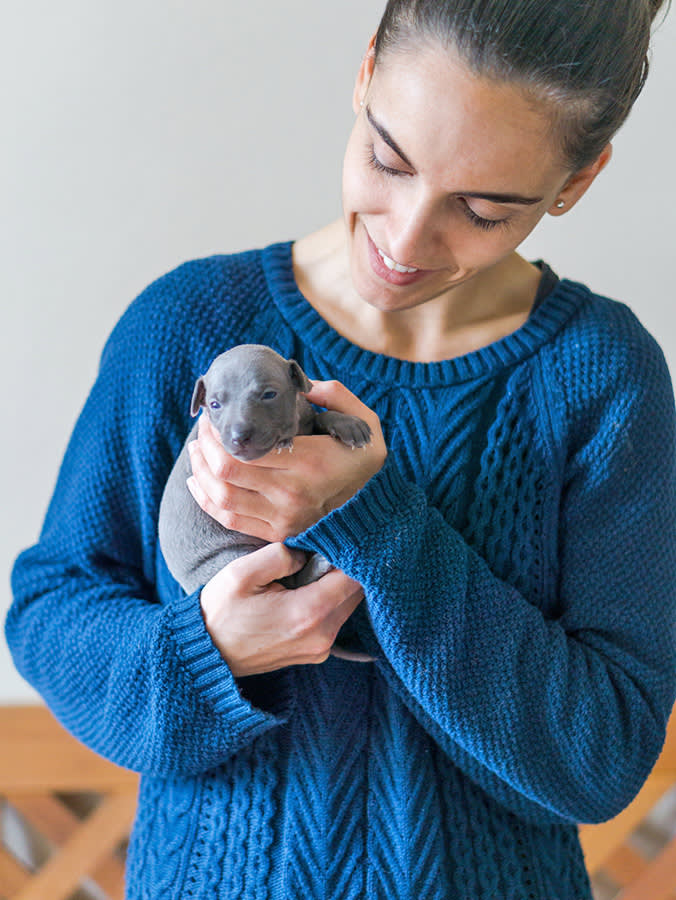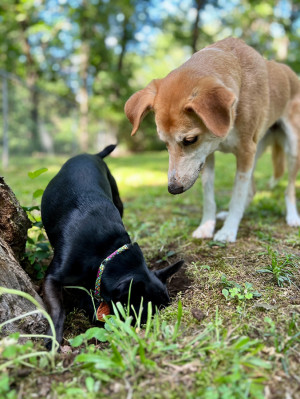When to Deworm Your Puppy
Not a fun topic, but we have to talk about it.

Share Article
In This Article:
Why Do Vets Recommend Deworming? Risks of Worms to Puppies and People Deworming Medication Options Puppy Deworming Schedule
Deworming is a necessary part of puppy parenthood. Intestinal worms can have a huge impact on a puppy’s health and may pose risks to you and your family.
Why do vets recommend deworming?
Vets consider deworming to be an essential part of puppy care. Intestinal parasites can wreak havoc on a puppy’s overall health and affect the GI tract, coat, muscle mass, and red blood cells. Puppies have few natural defenses against parasites, and there are few sadder sights than a wormy puppy having a rough start to life. Intestinal parasites can put a pup’s human family at risk as well, so it’s important to take every step to keep the environment safe for everyone.
How do puppies get worms?
Puppies primarily get worms through fecal-oral transfer. This can happen if a puppy:

Sticks their nose in contaminated dirt or soil.
Licks their paws after walking through a contaminated area.
Licks contaminated objects and surfaces.
Straight up eats infected poop.
Puppies can also get worms through maternal transmission. If a dog is infected with certain intestinal parasites during pregnancy, she can pass them on to her puppies while they’re in the womb or while they’re nursing. Eating infected small animals or infected raw meat is also a possible route of transmission.
How to tell if a puppy has worms
Diagnosis often requires a fecal exam, although seeing white worms in puppy poop can be an obvious clue. Signs of intestinal parasites in puppies include:
Worms in the stool or vomit
Diarrhea (plus or minus mucus or blood)
Pot-bellied appearance
Poor body condition
Dull coat
Vomiting
Coughing
Lethargy
Pale gums
Risks of worms to puppies and people
Deworming helps protect both the puppy and their family. Zoonoses are diseases that can be transmitted from animals to humans. Not every puppy parasite is zoonotic, but playing with a wormy puppy can put people at risk for some common puppy worms including:
Hookworms
Hookworm (Ancylostoma spp. and Uncinaria spp.) infections are common in adult dogs and puppies. Dogs can get hookworks through fecal-oral transmission, maternal transmission, or direct contact (larvae can actually penetrate through the skin). Hookworms will feed on a puppy’s blood and can cause severe anemia if left untreated.
Humans can be affected by fecal-oral transmission (like cleaning up puppy messes and not washing your hands before eating). Walking barefoot through contaminated grass and soil provides an opportunity for larvae to enter through the skin.
Tapeworms
Puppies can get tapeworms (Dipylidium caninum) by eating infected fleas, which highlights the importance of both internal and external parasite control. Puppies can also get tapeworms from eating contaminated meat (usually from rodents). Tapeworm segments can often be seen on puppy poop — they look like grains of rice. Tapeworms steal nutrients from a puppy's food, depriving the puppy of the nourishment it needs for growth.
The risk of humans getting tapeworms from their puppy is low, but it’s not impossible. It can happen if you accidentally swallow an infected flea.
Roundworms
Roundworms (Toxocara spp.) are very common parasites in puppies. Puppies acquire roundworms through fecal-oral transmission, eating infected rodents, or from their mother (in the womb or while nursing). Puppies with a high worm burden can be deprived of nutrition and will pass roundworms in their stool or vomit.
Humans can’t get roundworms directly from handling infected puppies, but they can be infected via fecal-oral transmission. Risks are higher for kids who play in dirt and sandboxes, people who are immunocompromised, or those with poor hand hygiene. Not everyone who accidentally swallows a roundworm egg will have symptoms; however, roundworms like a trek around the human body and can cause damage as they migrate through the lungs, brain, liver, or eyes.
Whipworms
Whipworms (Trichuris vulpis) are a hardy intestinal parasite. Whipworms wait until they reach a dog’s large intestines before maturing, which can take almost three months, so they usually don’t cause issues right away. But once mature, they can live in a dog’s gut for well over a year. The eggs that are shed in the stool are tough and can survive in the environment for several years. Whipworms feed off their host's blood and can cause bloody stool and anemia in puppies.
Trichuris vulpis, the dog whipworm, is not considered zoonotic, so it’s not a huge concern for humans. But if you want to be grossed out anyway, know that people can get Trichuris trichiura, human whipworm, from soil and foods contaminated with human feces.
Deworming medication options
Not every dewormer kills every type of worm. Even if a pot-bellied puppy is going around pooping out worms, your vet needs to perform a fecal exam to determine exactly what type of worms are present and the best puppy dewormer medicine options.
Repeat dosing is often required because different products will target a specific point in the worm life cycle. For example, if a dewormer only kills adult roundworms, the initial dose will kill the existing adults; then a follow-up dose is needed to kill the larvae once they’ve also matured into adults.
Many dewormers are available over the counter, but puppy parents should always consult a vet to determine the correct medication and dosage.
Liquid oral dewormers
Liquid dewormers can be easy to administer via syringe or dropper and are often flavored to help palatability. Liquids are also easier to dose precisely, especially for smaller pups. Common liquid dewormers (and the worms they kill) include:
Pyrantel pamoate (hookworms and roundworms)
Fenbendazole (roundworms, hookworms, whipworms, and some tapeworms)
Emodepside-Praziquantel combo (whipworms, some tapeworms, and other nematodes)
Oral dewormer tablets
Tablets can be conveniently administered when hidden in a treat. Flavored chews may be readily eaten as a treat. If giving your puppy a pill to swallow, be patient, and reward them with treats after. Common dewormers available in tablet form include:
Praziquantel (commonly prescribed for tapeworms)
Piperazine (roundworms)
Fenbendazole (roundworms, hookworms, whipworms, and some tapeworms)
Topical dewormer treatments
Topical dewormers can be in the form of monthly preventatives. Make sure that your pup is the minimum age indicated on the label before administering. Read the instructions carefully regarding bathing after administration. An example of a topical dewormer is imidacloprid and moxidectin combo, which kills hookworms, roundworms, and whipworms.
Puppy deworming schedule
Deworming your puppy isn’t a one-time task — regular deworming is part of preventative puppy care. Because puppies don’t have natural immunity to parasites, we assume that they were exposed in the womb or during nursing and take steps to ensure they’re worm-free.
The Companion Animal Parasite Councilopens in new tab and the American Animal Hospital Association opens in new tab recommend a puppy deworming schedule that starts early and often. Puppy deworming begins at two weeks of age and is repeated every two to four weeks until the puppy is started on a year-round preventative. Here’s a quick breakdown of what a puppy deworming schedule can look like:
Two weeks old: Start a broad-spectrum dewormer.
Up to eight weeks: Give them a broad-spectrum dewormer every two weeks. Perform intermittent fecal exams to determine if different medications are needed.
Eight to twelve weeks: Start heartworm preventative. Depending on the product used, this can also serve as monthly intestinal parasite control.
Up to 12 months: Fecal exams should occur at least four times in the first year.
Twelve-plus months: At least annual fecal exams.
Is the best time to deworm puppies morning or night?
It usually doesn’t matter what time of day you give a puppy their dewormer medicine. However, if you’re treating an extra wormy puppy (a pot-bellied one who’s already pooping worms), you may want to stick to the mornings. As the worms die, your pup may need extra potty breaks to pass some of the dead worms. This can last a few days.
Bottom line
Puppies need to be dewormed early and often, starting at two weeks of age. Vets usually prescribe broad-spectrum dewormers, but intermittent fecal exams are important to make sure specific intestinal parasites don’t need to be targeted. Although over-the-counter dewormers are available, puppy parents should consult with the vet to ensure their puppy receives proper medication at the correct dose.
References
Creevy, Kate, et al. 2019 AAHA Canine Life Stage Guidelines*. www.aaha.org/globalassets/02-guidelines/canine-life-stage-2019/2019-aaha-canine-life-stage-guidelines-final.pdfopens in new tab, https://doi.org/10.5326/JAAHA-MS-6999)opens in new tab.
“Gastrointestinal Parasites of Small Animals - MSD Veterinary Manual.” MSD Veterinary Manual, 2025, www.msdvetmanual.com/digestive-system/gastrointestinal-parasites-of-small-animalsopens in new tab. Accessed 29 Jan. 2025.
“General Guidelines for Dogs and Cats.” Companion Animal Parasite Council, capcvet.org/guidelines/general-guidelines/opens in new tab.
“Intestinal Parasites in Cats and Dogs.” American Veterinary Medical Association, 2024, www.avma.org/resources-tools/pet-owners/petcare/intestinal-parasites-cats-and-dogsopens in new tab.
“Whipworms in Dogs.” Cornell University College of Veterinary Medicine, 2024, www.vet.cornell.edu/departments-centers-and-institutes/riney-canine-health-center/canine-health-information/whipworms-dogsopens in new tab.

Dr. Alycia Washington, DVM, MS
Alycia Washington is a small-animal emergency veterinarian with over 10 years of experience based in North Carolina. She works as a relief veterinarianopens in new tab and provides services to numerous emergency and specialty hospitals. She also works as a veterinary writer with a focus on educating pet parents.
Related articles
![One month old brown brindle Jack Russell puppy lies on a woman's lap. She strokes the dog's soft tummy. Mother dog is watching nearby.]()
Puppy Parasites 101: What You Need to Know to Keep Your Pup Safe
Does your pup have a pot belly? Have you noticed something moving in their poop? Yep — it’s time to talk about puppy parasites.
![Woman snuggling her puppy in her arms.]()
Puppy Diarrhea: Possible Causes and What to Do About It
Diarrhea in puppies can be caused by many things.
![Full length portrait of young African-American woman walking dog in park outdoors in Summer.]()
What to Do If You Find Worms in Your Dog’s Poop
Hopefully this isn’t info you’ll have to reference often, but here’s what you should know.
![Black puppy itches behind her ear due to flea allergy]()
Shoo, Flea: What to Do About Your Dog’s Disturbing Flea Allergy
Before you say “ewww” Moira Rose-style, learn these steps to prevent and remove fleas.
![A mini golden doodle puppy licking and grooming itself.]()
Treatment for Your Dog’s Bleeding Anus: Home Remedies and Medical Options
It’s not a pretty problem, but here are your solutions.
When Can a Puppy Get a Rabies Shot?
And what you should expect after they receive it.








